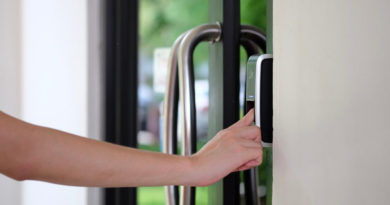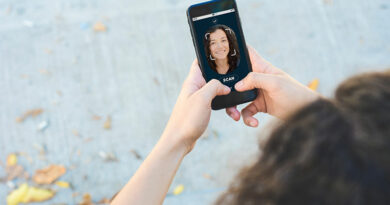Fingerprint-Locked Smartphones: Unlocking Your Constitutional Rights?

The following guest post was submitted by Sarah Smith.
Biometrics may soon effect the outcome of criminal law proceedings if a Virginia Beach judge’s ruling is any indication of the implications of owning a fingerprint-locked smartphone. According to the judge, such devices are not covered under the 5th Amendment, which protects individuals who refuse to give up their passcodes to their mobile devices. Individuals may now be compelled to give their fingerprints for law enforcement to access their mobile devices. This comes as no surprise to experts who predicted that such a matter would arise with biometric security features on mobile devices.
David Baust is an Emergency Medical Services captain who has been charged with attempted murder for allegedly trying to strangle his girlfriend to death. Prosecutors in the case have reason to believe that Baust’s smartphone may contain a video of the offense. Prosecuting attorneys filed a petition with the court asking that the smartphone be made available to them. In the defense attorney’s dispute against granting the petition, it was argued that refusing to make the smartphone available was an action that is protected under the 5th Amendment. According to Judge Steven Frucci, the 5th Amendment does not apply to Baust’s smartphone since it is accessible by biometrics. If the smartphone had been locked and accessible with only a passcode, then the 5th Amendment would apply since it would be protecting Baust’s right to not reveal information that could lead to self-incrimination. Since the smartphone could be unlocked with Baust’s fingerprint, Judge Frucci decided that a fingerprint was not like a passcode but was actually a physical component. Although the judge ruled that a fingerprint-locked smartphone could legally be accessed, he agreed with Baust’s attorney that in this particular case self-incrimination would occur and the smartphone will not be accessed.
It is alarming that mobile devices that feature biometrics as a security measure may not be protected under the 5th Amendment. Experts in the legal and technology fields anticipated such a matter happening when Apple initially marketed a smartphone that could be unlocked with the user’s fingerprint. This case has caught the attention of Electronic Frontier Foundation, a digital rights organization. Hanni Fakhoury, an attorney with the organization, acknowledged that smartphone users who utilize the biometrics security feature may not be afforded the same protection in the legal system that a passcode would allow. While it is common in criminal law cases for the prosecutor to file pleadings to compel evidence from the defendant, there are no clear cut laws on how biometric security features should be considered. Criminal lawyers like Quinn & Scattini will surely come across biometric security features in future cases and will have to consider the legality of making these devices accessible to the prosecution.
While the world of technology is constantly evolving, constitutional rights and laws have been slow to keep up with these changes. There will likely be many more cases that come through the legal system that involve biometric security features on mobile devices. The question of whether it is legal to compel the user to hand over his or her fingerprint will no doubt arise again. In this particular case, the defendant was essentially protected from doing so because handing over his fingerprint would be incriminating. But what about other smartphone users? Are their fingerprints really the key to unlocking their right to the 5th Amendment?











Pingback: Best Apps for Business Consultants - Today Tech Today Tech